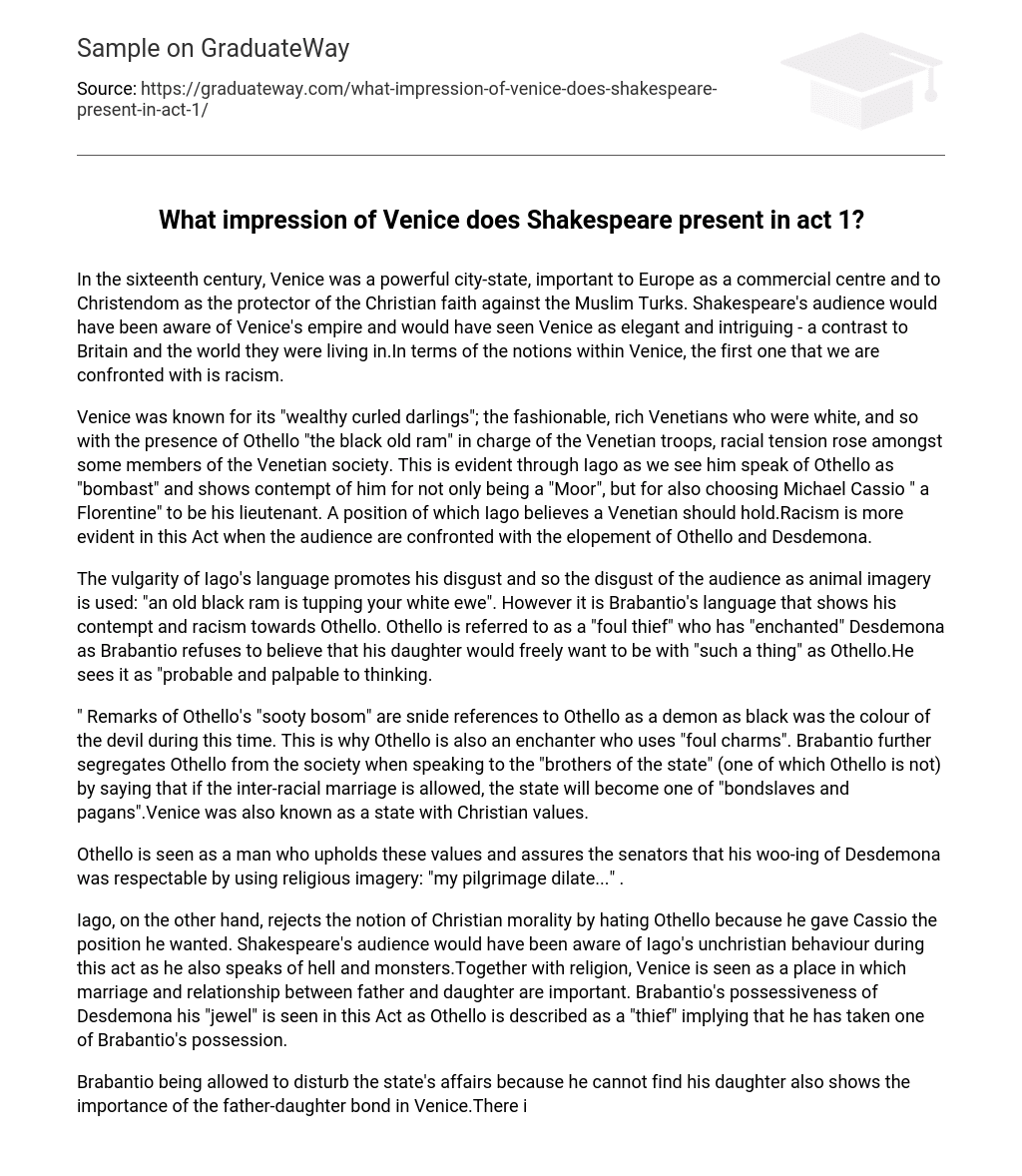In the sixteenth century, Venice was a powerful city-state, important to Europe as a commercial centre and to Christendom as the protector of the Christian faith against the Muslim Turks. Shakespeare’s audience would have been aware of Venice’s empire and would have seen Venice as elegant and intriguing – a contrast to Britain and the world they were living in.In terms of the notions within Venice, the first one that we are confronted with is racism.
Venice was known for its “wealthy curled darlings”; the fashionable, rich Venetians who were white, and so with the presence of Othello “the black old ram” in charge of the Venetian troops, racial tension rose amongst some members of the Venetian society. This is evident through Iago as we see him speak of Othello as “bombast” and shows contempt of him for not only being a “Moor”, but for also choosing Michael Cassio ” a Florentine” to be his lieutenant. A position of which Iago believes a Venetian should hold.Racism is more evident in this Act when the audience are confronted with the elopement of Othello and Desdemona.
The vulgarity of Iago’s language promotes his disgust and so the disgust of the audience as animal imagery is used: “an old black ram is tupping your white ewe”. However it is Brabantio’s language that shows his contempt and racism towards Othello. Othello is referred to as a “foul thief” who has “enchanted” Desdemona as Brabantio refuses to believe that his daughter would freely want to be with “such a thing” as Othello.He sees it as “probable and palpable to thinking.
” Remarks of Othello’s “sooty bosom” are snide references to Othello as a demon as black was the colour of the devil during this time. This is why Othello is also an enchanter who uses “foul charms”. Brabantio further segregates Othello from the society when speaking to the “brothers of the state” (one of which Othello is not) by saying that if the inter-racial marriage is allowed, the state will become one of “bondslaves and pagans”.Venice was also known as a state with Christian values.
Othello is seen as a man who upholds these values and assures the senators that his woo-ing of Desdemona was respectable by using religious imagery: “my pilgrimage dilate…” .
Iago, on the other hand, rejects the notion of Christian morality by hating Othello because he gave Cassio the position he wanted. Shakespeare’s audience would have been aware of Iago’s unchristian behaviour during this act as he also speaks of hell and monsters.Together with religion, Venice is seen as a place in which marriage and relationship between father and daughter are important. Brabantio’s possessiveness of Desdemona his “jewel” is seen in this Act as Othello is described as a “thief” implying that he has taken one of Brabantio’s possession.
Brabantio being allowed to disturb the state’s affairs because he cannot find his daughter also shows the importance of the father-daughter bond in Venice.There is a strong sense of hierarchy when looking at Act I. Earlier on in scene one, when Roderigo and Iago rouse and disturb Brabantio; his language portrays one of a man who strongly believes in authority. Brabantio assumes that Roderigo and Iago are drunkards and therefore of a lower status.
His language contains authority “I have charged thee..” and he lets Iago and Roderigo know that he has the power to make them suffer for disturbing him.Othello tells the audience he is of a “royal siege” and is aware that not only his character but also his “title” will justify him for marrying Desdemona.
Iago is aware that he must obey and be loyal to Othello because of his position even though it may only be for show: “I must show out a flag and sign of love, which is indeed but sign.”The senators and Duke are also seen as important in Venice as it is an oligarchy state. The word of the Duke is final and the other senators recognise this as he is referred to as “most gracious” and “most reverend”.Venice is a state of law and order.
Its political and military strength influences the way the characters act. The opening Act shows us an orderly and formal society who strategically work issues out. By giving us this fresh impression, our ideas of Venice can later be challenged as the play progresses.





